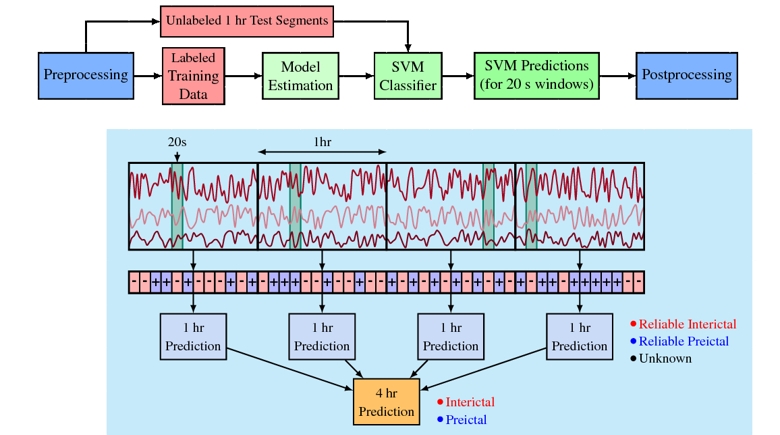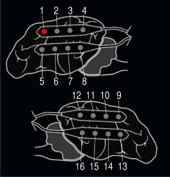 This paper describes a data-analytic modeling approach for the prediction of epileptic seizures from intracranial electroencephalogram (iEEG) recording of brain activity. Even though it is widely accepted that statistical characteristics of iEEG signal change prior to seizures, robust seizure prediction remains a challenging problem due to subject-specific nature of data-analytic modeling. Our work emphasizes the understanding of clinical considerations important for iEEG-based seizure prediction, and proper translation of these clinical considerations into data-analytic modeling assumptions. Several design choices during preprocessing and postprocessing are investigated for their effect on seizure prediction accuracy. Our empirical results show that the proposed support vector machine (SVM)-based seizure prediction system can achieve robust prediction of preictal and interictal iEEG segments from dogs with epilepsy. The sensitivity is about 90–100%, and the false-positive rate is about 0–0.3 times per day. The results also suggest good prediction is subject-specific, in agreement with earlier studies. Good prediction is possible only if the training data contain sufficiently many seizure episodes, i.e., at least 5–7 leading seizures. The proposed system uses subject-specific modeling and unbalanced training data. This system also utilizes three different time scales during training and testing stages.
This paper describes a data-analytic modeling approach for the prediction of epileptic seizures from intracranial electroencephalogram (iEEG) recording of brain activity. Even though it is widely accepted that statistical characteristics of iEEG signal change prior to seizures, robust seizure prediction remains a challenging problem due to subject-specific nature of data-analytic modeling. Our work emphasizes the understanding of clinical considerations important for iEEG-based seizure prediction, and proper translation of these clinical considerations into data-analytic modeling assumptions. Several design choices during preprocessing and postprocessing are investigated for their effect on seizure prediction accuracy. Our empirical results show that the proposed support vector machine (SVM)-based seizure prediction system can achieve robust prediction of preictal and interictal iEEG segments from dogs with epilepsy. The sensitivity is about 90–100%, and the false-positive rate is about 0–0.3 times per day. The results also suggest good prediction is subject-specific, in agreement with earlier studies. Good prediction is possible only if the training data contain sufficiently many seizure episodes, i.e., at least 5–7 leading seizures. The proposed system uses subject-specific modeling and unbalanced training data. This system also utilizes three different time scales during training and testing stages.

